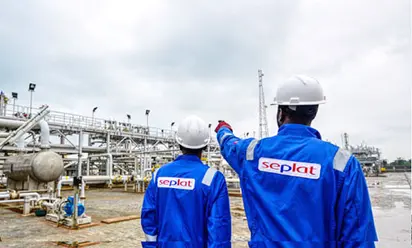The revelation from Mr. Effiong Okon, the Director of New Energy at Seplat PLC, has unveiled the ambitious plans of the company to venture into the downstream sector of the oil and gas industry with the construction of a cutting-edge $250 million gas plant in Sapele, Delta state. This strategic move was disclosed during the Nigeria Oil and Gas Outlook event, which revolved around the theme “Investing in Nigeria’s Energy Future” held in Lagos.
The visionary Effiong, while participating in a panel discussion focused on securing energy transition towards gas, shed light on the significant undertaking. He articulated, “We are also starting a brand-new plant in Sapele, the Sapele gas plant – another $250 million investment that will deliver a lot of LPGs to the market.” This announcement showcases Seplat PLC’s commitment to advancing the nation’s energy landscape and capitalizing on the opportunities present in the downstream sector.
Moreover, Mr. Effiong provided insights into the timeline of another major project, revealing that the company’s Joint Venture (JV) gas processing facility in Imo is set to be completed by December. Following its completion, the facility is anticipated to be ready for commissioning in January 2024, marking a significant milestone for Seplat PLC in contributing to the country’s gas processing infrastructure.

In emphasizing the role of stakeholders in the oil and gas sector, Mr. Effiong stressed the importance of private sector leadership in investments. He articulated that while the private sector should take the lead in driving investments, the government’s role should be one of support through the implementation of favorable policies and the provision of a secure environment for such ventures.
A notable voice in the panel discussion, Felix Ekundayo, added another layer to the conversation by highlighting the need for a nuanced approach to policy-making in the sector. He advocated for distinct policies tailored to each component of oil and gas, emphasizing that the term “gas” encompasses various components, each requiring specific attention. Mr. Ekundayo articulated, “When we say gas, we are very blind about what we mean. Everybody understands that petrol, and diesel. kerosene but we don’t have that of gas.”
He further delved into the intricacies of gas components, noting that gas can be distilled into two main categories: natural gas and LPG (liquefied petroleum gas). Within the LPG component, there exist propane and butane, each with its unique characteristics and applications. The crux of Mr. Ekundayo’s argument lies in the necessity for Nigeria to develop distinct policies catering to the diverse facets of the gas sector. Drawing a parallel, he emphasized that a policy designed for kerosene cannot be effectively applied to gasoline, underscoring the need for tailored and precise policymaking.
In addition to discussing policy frameworks, Mr. Ekundayo underscored the importance of local financing for downstream gas projects in Nigeria. Expressing a degree of skepticism regarding the reliability of foreign investments, he advocated for a more self-reliant approach to financing these projects. This perspective aligns with the broader trend of promoting indigenous capacity and self-sufficiency in the development and execution of critical infrastructure projects.
Seplat PLC’s strategic investment in the Sapele gas plant, coupled with the imminent completion of the JV gas processing facility in Imo, reflects the company’s proactive role in shaping Nigeria’s energy future. As discussions surrounding policies and financing models continue, stakeholders in the oil and gas sector are presented with an opportune moment to collaborate, innovate, and contribute to the sustainable development of Nigeria’s energy landscape. The unfolding narrative paints a picture of a dynamic sector on the cusp of transformative change, with Seplat PLC positioned as a key player in driving this positive shift.
Support InfoStride News' Credible Journalism: Only credible journalism can guarantee a fair, accountable and transparent society, including democracy and government. It involves a lot of efforts and money. We need your support. Click here to Donate
